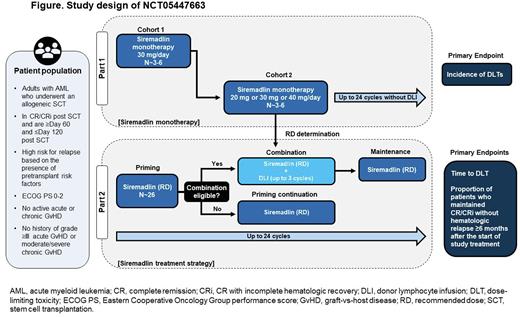Abstract
Background: Relapse post allogeneic stem cell transplantation (SCT) remains the main cause of treatment failure (~40%) for patients (pts) with acute myeloid leukemia (AML). Many pts who ultimately relapse post SCT do so within the first year post transplant, and earlier relapse is associated with poorer survival. Therapeutics that prevent early relapse for these pts are urgently needed. Early cellular or pharmacologic intervention or maintenance strategies that enhance the graft-versus-leukemia (GvL) effect after SCT are of renewed interest as they have the potential to reduce relapse risk post SCT. Siremadlin (HDM201) is a novel investigational MDM2 inhibitor with single-agent, anti-AML activity. MDM2 inhibitors, including siremadlin, possess potent immunomodulatory effects in murine solid tumor and AML models. MDM2 inhibition has been shown to synergize with the allogeneic immune response, increase the vulnerability of AML cells to allogeneic donor T cells, and promote the cytotoxicity and longevity of allogeneic donor T cells in murine models. As such, the post-SCT setting is ideal for investigating the immunomodulatory effects of MDM2 inhibition on enhancing the GvL effect (Ho et al. Blood. 2022). Here we describe the design of a Phase Ib/II, open-label study of siremadlin as monotherapy and in combination with donor lymphocyte infusion (DLI) in pts with AML post SCT who are in complete remission (CR) but at high risk for relapse based on the presence of pre-SCT risk factors (NCT05447663).
Study Design: The trial is not yet recruiting but aims to enroll ~38 adult pts with AML who underwent first SCT and are currently between Day 60-120 post SCT. Prior to a patient's SCT, they must have a risk factor that puts them at high risk for relapse, including AML in first CR with adverse risk genetics per 2017 European LeukemiaNet risk stratification, therapy-related AML, or secondary AML; or AML in second or greater CR. The SCT must be from an 8/8 human leukocyte antigen (HLA) matched related or unrelated donor at HLA-A, -B, -C, -DRB1 loci using unmanipulated/T-cell replete bone marrow or peripheral blood stem cells as a stem cell source. Post SCT, pts must have achieved CR or CR with incomplete hematologic recovery (CRi) with no evidence of hematologic relapse. Exclusion criteria include prior exposure to an MDM inhibitor, active graft-vs-host disease (GvHD), past history of grade ≥III acute GvHD (aGvHD) or moderate/severe chronic GvHD (cGVHD), recipient of SCT from a haploidentical family donor or cord blood transplant, and prior systemic AML-directed treatments given at any time after SCT (including DLI). This study contains 2 parts, Part 1 is a dose confirmation of siremadlin monotherapy and will enroll ~12 pts. Siremadlin will be tested at a maximum of 3 dose levels with a starting dose of 30 mg/d on Days 1-5 of a 28-day cycle, dose level +1 at 40 mg/d and dose level -1 at 20 mg/d. The safety and tolerability of these dose levels will be assessed to determine the siremadlin recommended dose (RD) for Part 2. Pts in Part 1 of the study will receive siremadlin monotherapy for the entire duration of the treatment and will not receive DLI. Subsequently, ~26 pts will be enrolled in Part 2 and proceed through a priming phase with siremadlin monotherapy at the RD, followed by a combination phase of siremadlin + DLI, and subsequently a maintenance phase with siremadlin monotherapy (Figure). Primary safety endpoints of the study are incidence of dose-limiting toxicities (DLTs) in Part 1 and time to DLT in Part 2. The primary efficacy endpoint is the proportion of pts in Part 2 who are alive and maintained CR/CRi without hematologic relapse ≥6 months after the start of study treatment. Secondary endpoints include number of pts in Part 1 who are alive and maintained CR/CRi without hematologic relapse ≥6 months after the start of study treatment at the RD for Part 2, time to first documented hematologic relapse or death, incidence of relapse at 1 year and 2 years post study treatment, safety, GvHD-free/relapse-free survival, incidence of and time to treatment-emergent grade ≥III aGvHD or moderate/severe cGvHD, and pharmacokinetics.
Conclusions: This Phase Ib/II study investigates siremadlin monotherapy and siremadlin in combination with DLI in pts with AML in remission but at high risk of relapse post SCT. The study will evaluate the unique immunomodulatory potential of siremadlin to reduce risk of relapse in this population with high unmet need.
Disclosures
Zeiser:Incyte Corporation: Honoraria, Speakers Bureau; Mallinckrodt: Honoraria, Speakers Bureau; Novartis Pharmaceuticals: Honoraria, Speakers Bureau. Schmid:Novartis Pharmaceuticals: Honoraria, Speakers Bureau; Neovii: Honoraria, Speakers Bureau. Ram:Gilead: Honoraria; Novartis Pharmaceuticals: Honoraria; Takeda: Honoraria; BMS: Honoraria. Wu:Novartis Pharmaceuticals: Current Employment. Weber:Novartis Pharmaceuticals: Current Employment, Current equity holder in publicly-traded company. Grzesiak:Novartis Pharma AG: Current Employment. Eldjerou:Novartis Pharmaceuticals: Current Employment. Craddock:Daiichi-Sankyo: Consultancy; JAZZ: Consultancy, Research Funding; Celgene: Consultancy, Research Funding; Abbvie: Consultancy, Research Funding; Novartis: Consultancy.
Author notes
Asterisk with author names denotes non-ASH members.


This feature is available to Subscribers Only
Sign In or Create an Account Close Modal